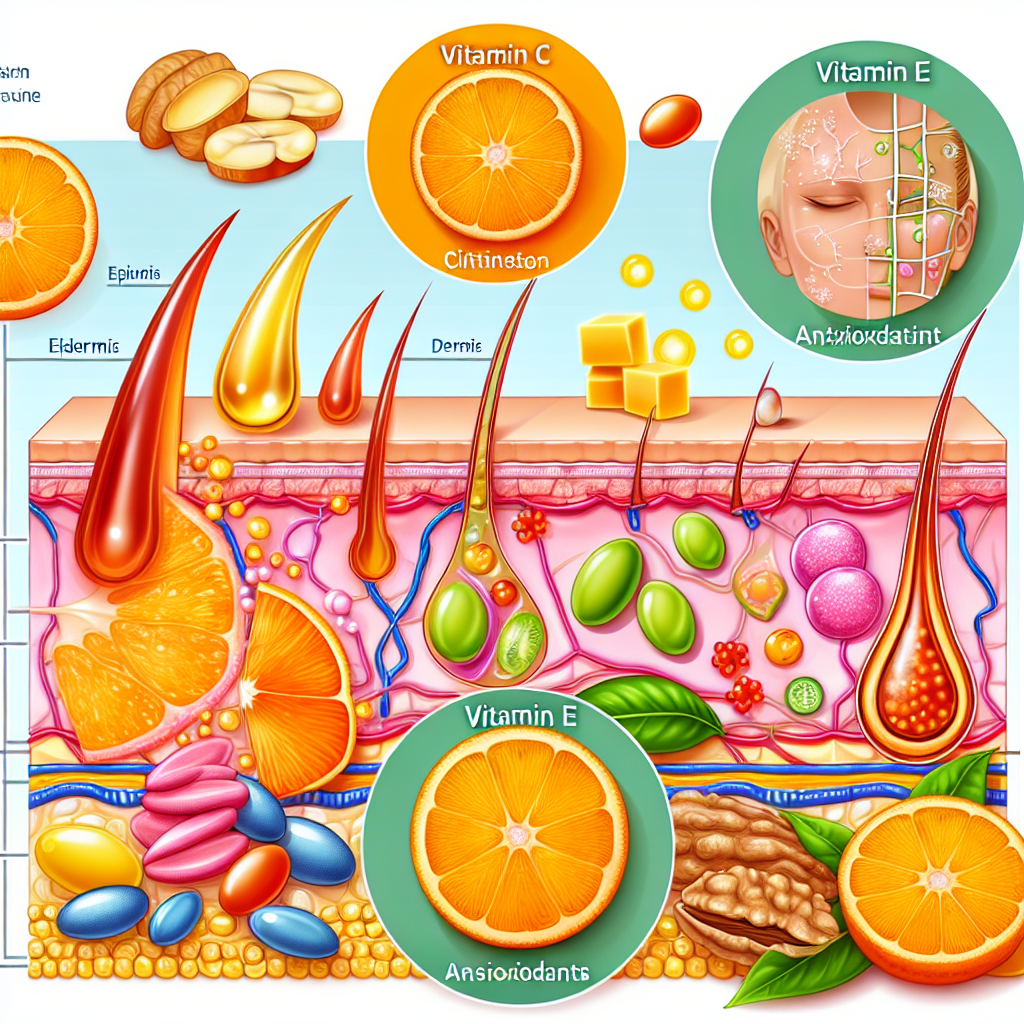How Vitamin C and E Keep Your Skin Glowing

Discover the secret to radiant skin with Vitamins C and E! These essential nutrients are key to maintaining a youthful glow and healthy complexion. Learn more about how you can incorporate them into your skincare routine. Visit www.myvibrantvitality.com today!
The Role of Vitamin C and E in Achieving Radiant Skin
The quest for radiant, glowing skin is a journey that many embark on, but few truly understand the science behind achieving this coveted look. The secret to maintaining a youthful, vibrant complexion lies not only in the products we apply topically but also in the nutrients we consume. Among these, vitamins C and E play a pivotal role in skin health, contributing significantly to its radiance and glow.
Vitamin C, also known as ascorbic acid, is a potent antioxidant that is essential for the synthesis of collagen, a protein that provides structure and elasticity to the skin. As we age, our bodies naturally produce less collagen, leading to the formation of wrinkles and fine lines. By promoting collagen production, vitamin C helps to maintain the skin’s firmness and smoothness, thereby contributing to a youthful appearance. Moreover, vitamin C is known for its ability to brighten the skin and fade hyperpigmentation, such as dark spots and age spots. This is achieved by inhibiting the enzyme tyrosinase, which is responsible for melanin production. By doing so, vitamin C helps to even out the skin tone, enhancing its overall radiance.
On the other hand, vitamin E is a fat-soluble nutrient that is renowned for its moisturizing properties. It helps to strengthen the skin’s barrier function, preventing moisture loss and keeping the skin hydrated. Hydrated skin is plump and luminous, which is why vitamin E is a key ingredient in many moisturizers and serums. Additionally, like vitamin C, vitamin E is a powerful antioxidant that protects the skin from damage caused by free radicals. These unstable molecules are generated by environmental stressors such as UV radiation and pollution, and they can cause premature aging by breaking down collagen and elastin. By neutralizing free radicals, vitamin E helps to preserve the skin’s structural integrity, preventing the onset of wrinkles and sagging.
Interestingly, vitamins C and E work synergistically to enhance each other’s effects. Vitamin C is water-soluble and works in the aqueous compartments of cells, while vitamin E is fat-soluble and works in the lipid compartments. This means that they can protect different parts of the cell from oxidative damage. Furthermore, vitamin C can regenerate oxidized vitamin E, allowing it to continue its antioxidant activity. This complementary action makes the combination of vitamins C and E particularly effective in promoting skin health.
Incorporating these vitamins into your skincare routine and diet can yield noticeable improvements in your skin’s appearance. They can be found in a variety of foods, with vitamin C being abundant in citrus fruits, strawberries, and bell peppers, and vitamin E in nuts, seeds, and leafy green vegetables. Topical products containing these vitamins are also widely available and can deliver their benefits directly to the skin.
In conclusion, the role of vitamins C and E in achieving radiant skin cannot be overstated. Their antioxidant properties, along with their ability to promote collagen production and hydration, make them indispensable for maintaining a glowing complexion. By understanding the science behind skin health, we can make informed choices that bring us closer to our skincare goals.
Unlocking the Secrets of Glowing Skin: The Power of Vitamins C and E

Unlocking the secrets of glowing skin is a quest that many embark on, but few truly master. The key, as it turns out, lies not in expensive creams or invasive procedures, but in the humble realm of vitamins. Specifically, vitamins C and E have been found to possess remarkable skin-enhancing properties. These two vitamins, when used correctly, can help you achieve the radiant, youthful skin you’ve always desired.
Vitamin C, also known as ascorbic acid, is a potent antioxidant that plays a crucial role in maintaining skin health. It is essential for the synthesis of collagen, a protein that provides structure and elasticity to the skin. As we age, our skin’s natural collagen production decreases, leading to the formation of wrinkles and fine lines. By boosting collagen production, vitamin C helps to maintain skin’s firmness and elasticity, thereby reducing the signs of aging.
Moreover, vitamin C has been shown to mitigate the damage caused by harmful ultraviolet (UV) radiation. Exposure to UV radiation from the sun is one of the leading causes of premature skin aging, resulting in symptoms such as wrinkles, age spots, and a leathery texture. Vitamin C protects the skin from this damage by neutralizing the free radicals produced by UV radiation, which are harmful molecules that damage cells and contribute to aging and disease.
On the other hand, vitamin E is another powerful antioxidant that complements the action of vitamin C. It is fat-soluble, meaning it is stored in the body’s fat tissues and can be used when needed. Vitamin E is particularly effective at protecting the skin from environmental damage caused by factors such as pollution and UV radiation. It does this by absorbing the harmful UV light from the sun when applied topically. This can help prevent dark spots and wrinkles, and it may also help reduce the risk of skin cancer.
Vitamin E also has an anti-inflammatory effect on the skin. When applied topically, it can help to soothe and calm inflamed skin, making it a useful treatment for conditions such as psoriasis and eczema. Furthermore, vitamin E has been found to speed up the skin’s healing process, making it a beneficial ingredient in creams and ointments used to treat cuts, burns, and other minor skin injuries.
The combination of vitamins C and E provides a powerful defense against skin aging. When used together, these vitamins have a synergistic effect, meaning they enhance each other’s antioxidant activity. This makes them more effective at combating the damage caused by free radicals and UV radiation, leading to healthier, more youthful-looking skin.
In conclusion, the secret to glowing skin may be as simple as incorporating more vitamins C and E into your skincare routine. These vitamins offer a range of benefits, from boosting collagen production to protecting against UV damage, that can help you achieve the radiant, youthful skin you’ve always desired. So, the next time you’re looking for a way to enhance your skin’s natural glow, consider reaching for products enriched with vitamins C and E. Your skin will thank you.
How Vitamins C and E Contribute to a Healthy, Glowing Complexion
Vitamin C and E are two essential nutrients that play a significant role in maintaining a healthy, glowing complexion. These vitamins are potent antioxidants that protect the skin from harmful free radicals, promote collagen production, and aid in skin repair and regeneration.
Vitamin C, also known as ascorbic acid, is a water-soluble vitamin that is crucial for skin health. It is a powerful antioxidant that neutralizes harmful free radicals, unstable molecules that can damage the skin cells and accelerate the aging process. By neutralizing these free radicals, vitamin C helps to prevent premature aging and maintain a youthful, radiant complexion.
Moreover, vitamin C is essential for collagen production, a protein that gives the skin its firmness and elasticity. As we age, our skin’s collagen production decreases, leading to wrinkles and sagging skin. By promoting collagen production, vitamin C helps to keep the skin firm and youthful. Additionally, vitamin C can help to lighten hyperpigmentation and dark spots, resulting in a more even and radiant skin tone.
On the other hand, vitamin E, also known as tocopherol, is a fat-soluble vitamin that is also a powerful antioxidant. It protects the skin from environmental damage caused by exposure to the sun’s harmful ultraviolet (UV) rays. By absorbing these UV rays, vitamin E helps to prevent sunburn, reduce the risk of skin cancer, and prevent premature skin aging.
Furthermore, vitamin E aids in skin repair and regeneration. It accelerates the healing process of damaged skin and helps to reduce the appearance of scars. Vitamin E also helps to keep the skin moisturized by strengthening the skin’s barrier function, which prevents moisture loss and keeps the skin hydrated and supple.
Both vitamin C and E work synergistically to provide maximum benefits for the skin. When used together, they enhance each other’s antioxidant activity, providing even more protection against free radicals and UV damage. This synergistic effect results in healthier, more radiant skin.
However, it’s important to note that while both vitamins are beneficial for the skin, they should be used appropriately to avoid potential side effects. Overuse of vitamin C can cause skin irritation and sensitivity, while excessive use of vitamin E can lead to skin breakouts. Therefore, it’s recommended to use these vitamins in moderation and as part of a balanced skincare routine.
In conclusion, vitamins C and E are essential for maintaining a healthy, glowing complexion. They protect the skin from harmful free radicals and UV damage, promote collagen production, aid in skin repair and regeneration, and keep the skin moisturized. By incorporating these vitamins into your skincare routine, you can achieve and maintain a youthful, radiant complexion. However, remember to use these vitamins appropriately to avoid potential side effects and achieve the best results.